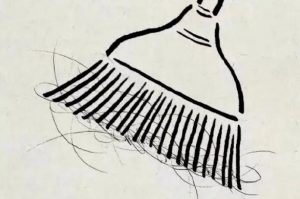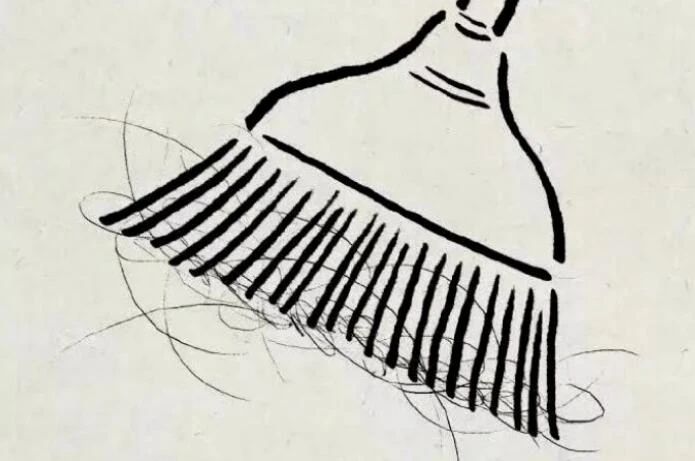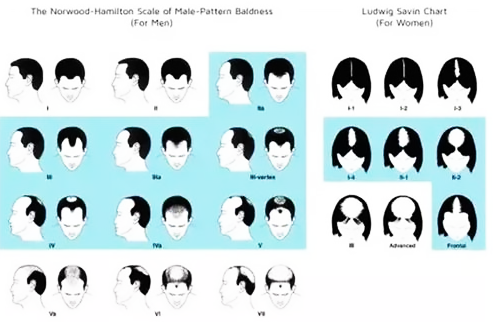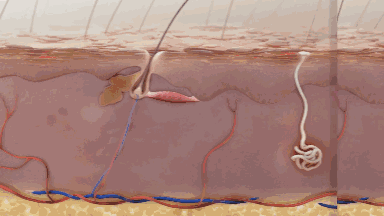
The stress on adults often affects the hair.
A large number of studies have suggested that alopecia areata is related to factors such as heredity, mood, stress, endocrine disorders, etc., especially excessive mental stress.
How does stress bring away our hair?
A research paper published in the top academic journal Nature pointed out the mechanism behind long-term stress leading to hair loss, and proposed possible ways to reverse this phenomenon.
When a person is under stress, a series of hormones are secreted in the body, among which cortisol released by the adrenal gland is the most typical, commonly known as “stress hormone.”
Normally, hair will continue to grow, fall off, and re-grow, which is related to the growth cycle of hair follicles.

Growth period
Hair follicle stem cells are activated, promote cell proliferation, and transform the cells into hair.
Degradation period
Hair follicles enter the degenerative period, and hair growth stops.
Resting period
The hair follicle enters the resting period. After a period of time, the hair fall off.
After the resting period is over, the hair follicles re-enter the growth phase, and new hair grows out.
This study confirmed that when corticosterone levels increase, the resting period of many hair follicles will be prolonged, causing new hairs to grow late.
Corticosterone does not directly act on hair follicle stem cells, but affects hair growth through the papilla.
Alopecia areata
Anti-inflammatory + hormone therapy
Patients with alopecia areata usually wake up and suddenly find that a piece of their hair or eyebrows mysteriously disappeared, commonly known as “ghost shaving”. The most common affected groups are middle-aged people and some young people who are under high mental pressure, emotional tension and anxiety, and have poor rest and sleep.
Alopecia areata is an autoimmune disease. The patient’s own immune cells do not distinguish between foes and foes, and they have to fight civil war to attack “friendly” hair follicles, which leads to hair loss. Generally, anti-inflammatory and glucocorticoids are used to “mediate the civil war” to achieve the purpose of treatment.
Under the condition of paying attention to rest and avoiding mental stress, most alopecia areata can be cured by itself (3-6 months). If you don’t get better for more than 3 months, you should go to the dermatology department of a regular hospital.
Male pattern alopecia
Finasteride
Male pattern alopecia is androgenetic alopecia (seborrheic alopecia). The disease is more common in men and a small number of women between 20 and 40 years old. The root cause is heredity. Living conditions, emotions and environment will play a role in promoting it.

The severity of hair loss (blue area is in moderate)
At present, finasteride is the drug of choice for the treatment of androgenetic alopecia (except for women). It can reduce androgen receptor activity and prolong the life of hair follicles. When supplemented with other drugs, it will delay the progression of the disease.
Postpartum hair loss
Having rest
Many women have less and less hair between 3 and 6 months after giving birth. This is due to the influence of hormone levels during pregnancy and the hair growth cycle is disrupted, but generally within 3 to 9 months after delivery, this situation will gradually improve.
Therefore, the patient does not need to take medicine, pay attention to clean hair, rest more, and keep the mood happy.
Infectious alopecia
Antibacterial treatment
There are many bacteria and fungi in our lives. If we don’t pay attention to hygiene or keep pets at home, such as teasing cats and dogs, touching the scalp without washing hands and disinfecting, the bacteria may cause hair follicle infection and cause scalp folliculitis; fungal infection of the hair and scalp It can cause tinea capitis, not only hair loss and hair loss, but also inflammation and even suppuration of the scalp.
If it is a bacterial infection, antibiotics should be used for treatment; if it is a fungal infection, antifungal treatment should be performed, and the surrounding environment should be treated at the same time, so that pets should be cleaned and treated.
Other reasons
Find out the cause
Changing the environment, staying up late, stressful, undergoing surgery, side effects of medications, blindly dieting to lose weight leading to anemia, lack of certain trace elements, etc. may all cause hair loss.
If it is related to the disease, it is recommended to listen to the advice of a specialist first. If the hair loss is caused by lifestyle, a balanced diet and adjustment of daily routines are required.
8 suggestions to avoid hair loss in life
For hair loss patients, slowing down the rhythm of life appropriately is very beneficial to “preserving the remaining hair volume”.

Adjust mentality
Long-term tension, anxiety, fatigue, etc. will aggravate hair loss. Hair loss patients should adjust their mentality, pay attention to rest, often take deep breaths, walks, etc., mental relaxation is conducive to hair growth.
Ensure adequate sleep
People with poor sleep quality are more likely to lose hair. Therefore, it is recommended that patients go to bed on time to ensure sleep time and improve sleep quality, which will help improve hair loss.
Avoid using the computer for a long time
Long-term use of the computer, high concentration of attention, and continuous nervousness can cause autonomic and endocrine dysfunction, resulting in malnutrition of hair follicles and hair loss.
Nutrition balance
Hair loss patients should pay attention to a balanced diet, stay away from “heavy taste” foods, increase the proportion of grains, vegetables, and fruits in the diet, and increase high-protein foods that have a “nourishing” effect on the hair, such as milk, lean meat, poultry and fish class.
Wash once every 2 days
Too often or too little shampoo is not good for the maintenance of hair. Generally, it is enough to wash every other day. The temperature of shampoo should be around 40℃. When shampooing, gently massage the scalp, which can clean the scalp and also Promote blood circulation in the scalp.
Use a wooden comb or horn made comb
Hair loss patients should always keep a handy comb, preferably a wooden comb or a horn comb, which can reduce the damage of static electricity to the hair.
Quit smoking
Smoking will shrink the capillaries of the scalp and affect the normal growth of hair. It is one of the risk factors for hair loss. A number of studies have found that the incidence of hair loss among smokers is much higher than that of non-smokers.
Hair should not be tied too tightly
Excessive pressure, friction, and pulling of the hair can cause hair loss. Therefore, do not pull the hair excessively when tying the hair, and do not tie the hair too tightly.
In addition, dyeing, perming, and exposure to the sun may damage the hair, causing the hair to become dry, hard and brittle, and more likely to break.
Hair regrowth is a very slow process, so long-term adherence to treatment is required. There is no need to be overly depressed during hair loss. A considerable number of patients can get a significant improvement if the treatment is adhered to.
Comments